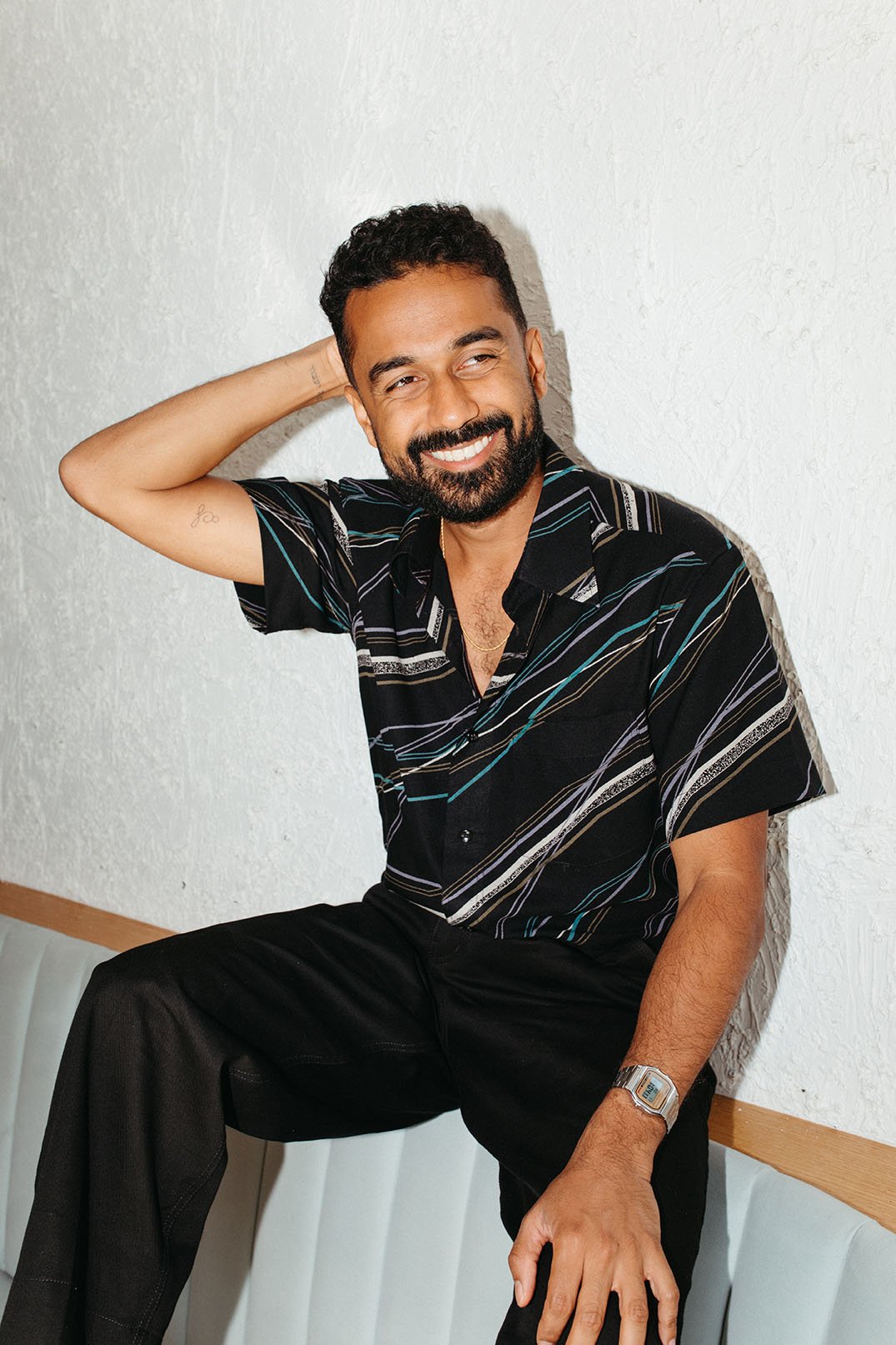Canadian Filmmakers at TIFF
DISCLAIMER: We do not represent SAG/AFTRA or the WGA in any form. The following are individual opinions only. Please see the SAG/AFTRA or WGA websites for current information on the strikes. Read our #UnionStrong Statement here.
Intro by Nolwen Cifuentes
Interviews & Photography by Kristina Ruddick
Produced by Hannah Antaki & Nadine Bhabha
Assisting by Sumi Siddiqa
Shot at SARA Restaurant
As the final weekend of the Toronto International Film Festival (TIFF) approaches, JULY had the opportunity to speak with several Canadian filmmakers.
In a time when big studios are being called out for exploiting filmmakers, independent cinema stands out as a unique and vital contributor to the film industry. For many years, independent filmmakers have been the driving force behind the industry, providing alternative perspectives, fresh narratives, and a deep connection to the human experience that goes beyond the mainstream. Their films often tackle social issues, amplify voices that are underrepresented, and act as a mirror that reflects the complexities of our world. In an age where entertainment is largely driven by corporations, independent cinema remains the leader of innovation and authenticity, reminding us of the transformative power that stories can possess when they are not constrained by commercial considerations.
As the digital age continues to reshape the filmmaking landscape, filmmakers are exploring if and how artificial intelligence can be used as a tool. However, concerns have emerged about AI's potential to homogenize storytelling, diluting the unique perspectives that define independent cinema.
With TIFF taking place in the Hollywood of the North, we thought it’d be fitting to focus on Canadian voices for this story. Keep scrolling to learn personal perspectives on the state of the film industry and how to best support Canadian and independent filmmaking.
This is a big, monumental time, and we're doing the right thing. As painful as it is, it's got to be done. Or what we know could be taken away. —Ari Millen
Actors, writers, and creatives in general are not really strangers to obstacles. We’ve had to climb many a mountain to get to do what it is that we love to do. This is an important mountain to climb, and we are just excited to get back to doing what we love. —Ryan Ali
Canadian filmmakers are some of the dopest, most creative people in the game. For some reason, we are not as confident in our industry as we are in our foreign counterparts and we rely too much on outside validation. To remedy this, we must foster, nurture, and invest in Canadian talent on a financial level. The second step is giving audiences the knowledge of where to access our work. —Nadine Bhabha
It's so important right now to just let filmmakers do their work, let them tell their stories without so much interference. Without trying to make sure something makes money, or using things in the past that have made money as a template for things in the future, because no one knows what's going to be popular. No one knows when a sequel is going to be as good as the original. You can't know that for sure just because of a previous entity. You need to trust the artist to make their art. And if people like it, great. And if people don't, that's just what happens in the business anyway. Why not take the risk and let someone have an uncompromised vision? I think you really just need to listen to the people who have something to say and let them say it. —Mark O’Brien
In my spare time, I’ve been writing. A big part of filmmaking and the art that we do is it's not just the actual shooting bit, it's the prep work. I feel like right now, we have an opportunity to really develop our stories. Now is the time when we can write our own stories in our own space and make sure that when the strike is over and the deals are closed, we are ready to go stronger. —Mohammad Ali Hashmi
When things are slow on the acting side of things, I write. Ever since I began in this industry, I knew the best thing I could do as an actor was to give myself agency by creating my own work. For me, it's writing and performing sketch comedy online; it's developing TV shows, and preparing pitch packages; it's outlining a feature film. I try to capitalize on any opportunity I have to create with others and put myself out there in a positive light. —Robert Bazzocchi
While AI is an incredible advancement and it does provide a multitude of opportunities, I think, as a society as a whole, we're not yet that far advanced in our own emotional states, and how we deal with each other. It almost feels a little bit like putting the cart before the horse. Its potential is unlimited creativity. I really think there's a fine line and a balance that needs to be achieved between our advancements and where we still are as a whole, as a community, as a society, and as a civilization. I think that AI, while beneficial and can provide wonderful experiences and opportunities, does detract from the human experience. That is a cruel, essential part of what we do in this industry.
Things have been slow [during the strikes]. I almost feel like I'm not even in the industry anymore. But for myself, I've been keeping connected with industry friends, brainstorming, projects, and doing all these little things that I didn't have time for before. —Ellyn Jade
The whole AI conundrum is really a question of what we value. As long as we keep living like rats in a cage hitting the dopamine button with content, AI is going to be able to produce content to satisfy that desire. But, if we want to experience human stories and share in that together, and it's more than just content, then I don't know if AI is going to be able to do that. This film that I got to be part of, that's premiering at TIFF, is the kind of film that I don't think AI is going to be able to make. It's a human story. It comes from the hearts and minds of the people that made it. I want to cut the addiction to the content. —David Reale
I definitely think that AI will ruin the whole industry. We’re hopeless against it, and I'm so sorry to say that. We have to put some kind of measures in order to combat it because it is smarter than us. —Varun Saranga
There are a lot of great Canadian productions that I feel a lot of people aren't actually aware of because they haven’t been picked up by big studios. —Kudakwashe Rutendo
The best way to support Canadian filmmakers is by watching our films and sharing them with the people that you love. It can be hard to find because there's so much content available, but we're out there and we are making incredible things. So Google it. —Marni Van Dyk
Seek out their [Canadians] work. There are so many great Canadian film festivals happening in the fall through the winter. There are things like CBC Gem and Crave Originals where you can consume and support all of the amazing art that is being created here in our country. —Laura Jean Chorosrecki
The easiest thing you can do to support Canadian talent right now is try to watch some Canadian films. We did our red carpet the other day, and there's this young actress who's in the film. Her name is Maia Jae Bastidas. She’s just getting started in her career. A guy showed up on the red carpet and was like, “Maia!” He wanted her autograph, he had seen her on a show that she had played a small part on. We need a little bit more of that in Canada. If you see someone on your screen, on television, or in a film that you really like, go and seek them out. Try to find something else that they've done, and then go see that. That's a really good way to expand your horizons, certainly within the cultural content that we have here in this country. —Rebecca Liddiard
There's an opportunity to support independent cinema now. When it comes to promoting things, showing up in person and being that visual representation is very meaningful. My hope is that this production slowdown means that there'll be more demand for indie and non-US films. Hopefully, it will help things get made that otherwise may have had a harder time getting financed. —Sofia Banzhaf
✦














